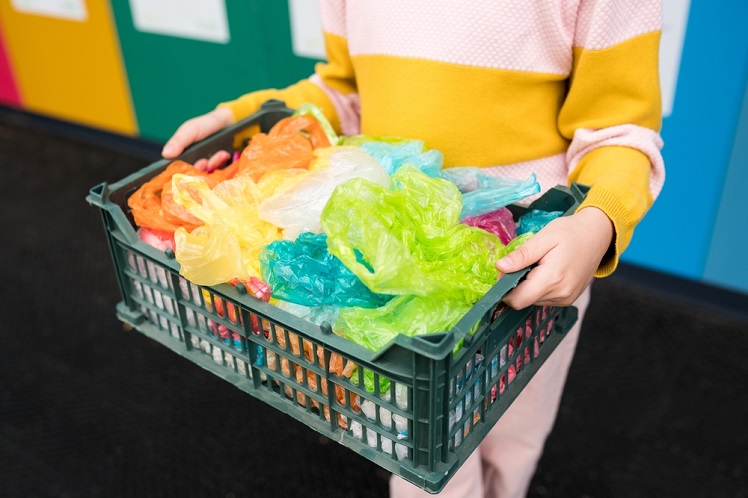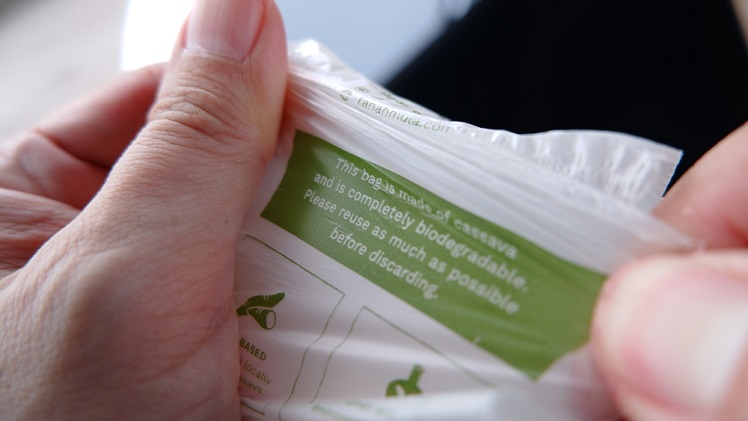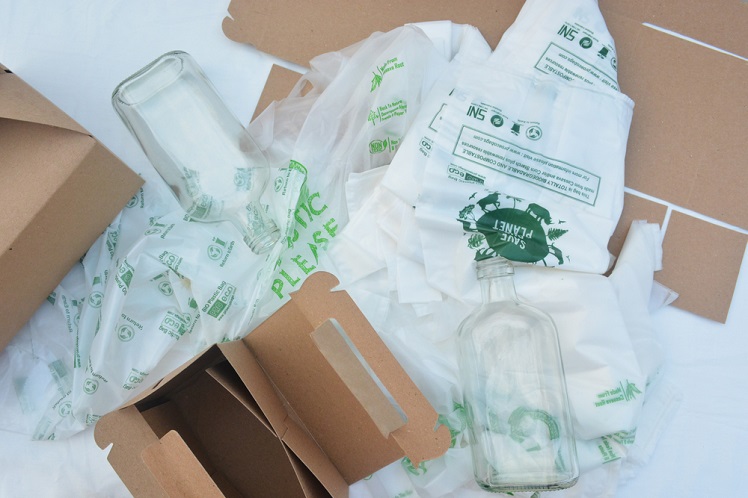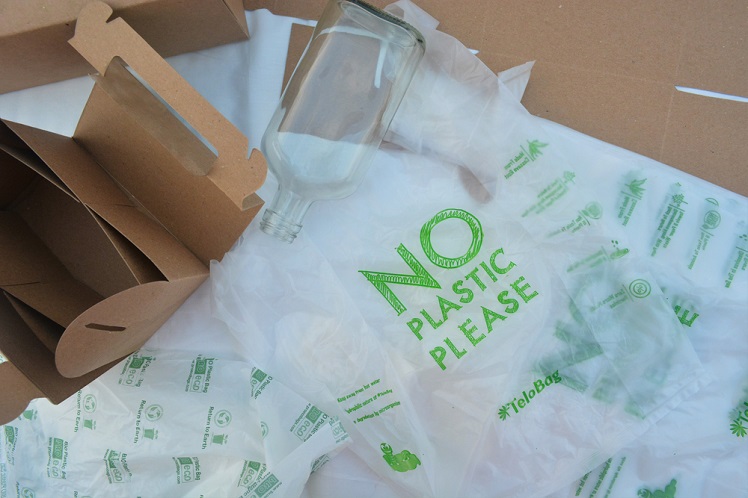In order to mitigate the worldwide epidemic of non-biodegradable and non-compostable plastic bags, Ecomaniac has introduced a viable alternative: Cassava Eco-Friendly Bags. These biodegradable and compostable bags are manufactured from starch extracted from the plants. Some manufacturers also add vegetable oil to the products to ensure quick degradation.
Furthermore, their nature significantly improves the environment, saves marine species, and prevents ecological catastrophes. Although currently, the development of cassava bags is not very fast, the projection until 2032 is very tempting.
According to the study, the revenue growth of cassava eco-friendly bags reached US$129.9 million by 2032, compared to US$ 62.2 million in 2022. With this data, it can be predicted that demand for cassava bags will be higher. It also shows that public awareness of the environment is getting more prominent over time. And to begin with, let us understand more about these biodegradable alternatives to the noxious plastic bags!
Table of Contents
Plastic: The Ubiquitous Toxic Polymer
Over the years, plastic has become a crucial asset of our daily lives as it is cheap, flexible, durable and versatile. We have included this long-lasting polymer in every facet of our lives today.
It is used to manufacture things that we use daily: carry bags, food wraps, cars, mobile phones, pens, headphones, tooth-brush, debit/credit cards and what not! Think about daily essentials and you’ll find plastic in it. Plastic has become ubiquitous.

Sadly, this widely-used miracle substance does have a critical flaw. The convenience offered by the plastics comes at the cost a bomb. These synthetic chemicals not only have a negative impact on human health, but also wreck the environment that sustains us.
It is evident that plastics are toxic oxymoron’s that do not belong in our world. So, what should be done? How can we contribute to environmental sustainability? What are the possible alternatives to plastics?
Understanding Cassava Bags
Cassava refers to a root vegetable that is rich in various nutrients. It ranks among the staple ingredients of a myriad of diets around the world. Analysis shows that cassava is the primary component of the diet of over 800 Million people.
Furthermore, there have been many studies on biodegradable films made from starch. However, it has not been widely commercialized. Finally, this opportunity was used by the first inventor of cassava bags, Kevin Kumala, to make biodegradable and eco-friendly products.

Departing from his concern about the contamination of plastic waste while diving made him think of a solution to overcome the issue. Seeing the promising potential of cassava and the abundance of these raw materials in Indonesia, his home country, made him want to create something from one of the largest sources of carbohydrates.
From that point, he tried to make cassava bags which became famous because of their ability to dissolve in water in less than 3 minutes. He also built his company called Avani Eco which distributes eco-friendly cassava-based products. After this success, many other companies have followed in his footsteps to produce eco cassava bags.
1. Cassava Bags: Biodegradable Bags
Cassava Bags are made from cassava starch, vegetable oil and organic resins. These bags are completely biodegradable and compostable. For example, they do not harm the environment throughout their entire life-cycle. These eco-friendly bags break down over a significantly lesser time when given to composting.
In addition to that, cassava bags are soluble in water under high temperatures, thus, they do not contaminate the environment.
2. Manufacturing Process of Eco-Friendly Cassava Bags
After getting to know cassava bags better, you may wonder how to produce cassava bags that are safe for the environment. Below, we summarize the manufacturing of biodegradable cassava bags, which includes three main stages: production of granules, film production, and production of bags. Each step plays a vital role in producing quality products that ensure safety for mother Earth. Check the details below!
- Production of Granules
Starch obtained from the cassava flour is mixed with some additives such as vegetable oil and organic resins. This blend is put into a granulator machine and given to a certain temperature and pressure, which results in the production of granules.
- Film Production
The granules obtained in the previous step are put into an extruder machine and films of various thicknesses are obtained. This film is stretched with the help of the rollers. The film is then cooled and rolled to be used in making cassava bags.
- Production of Bags
This step involves the making of cassava-based eco-friendly bags with the help of the film produced in the second step. Various kinds of cassava bags like t-shirt bags, grip-hole bags and garbage bags are produced in this final step. One of the manufacturers that produces cassava bags is Avani Eco.
3. Types of Cassava Bags
Immense increase in the demand of Petroleum-free bags has led to its production at an extensive scale. A myriad of countries that care about conserving the environment have made the use of biodegradable bags mandatory.
Mentioned below are 3 types of cassava bags:
- Cassava Grip-Hole Bags
Cassava-based grip-hole bags are a sustainable alternative to the plastic grip-hole bags. Their decomposition does not harm the environment when given to composting. If you are interested, the SavaBag produces these Grip-Hole bags with various sizes you can choose for your products or services.
- Cassava T-shirt Bags
Cassava T-Shirt Bags are a great replacement for the plastic bags. They can be used to carry food items and other stuff. By using them one can effectively contribute to conserving the limited non-renewable resources of the Earth. Some of the manufacturers you can look up to when you need t-shirt bags are Avani Eco and SavaBag.
- Cassava Garbage Bags
Cassava-based garbage eco-bags are a solution to the plastic garbage bags as they are more sustainable and compostable. Replace the plastic garbage bags with cassava garbage bags and take a Cassava Grip-Hole bags significant step towards the conservation of Mother Nature. Wanna try to change your plastics into these bags? Check on Avani Eco!
Pros and Cons of Cassava Bags
1. The Benefits of Cassava Bags
Cassava eco-friendly bags merupakan salah satu solusi untuk mengurangi polusi sampah plastik. Kira-kira apa saja manfaat this product to help save our planet?

- Edible
Cassava bags are water soluble to ensure they are safe for the environment. Thus, they won’t endanger wildlife and marine life when they end up in the ocean. In addition, some cassava bag products are edible. One example is the products produced by Avani Eco, such as cassava polybags and t-shirt bags. And so, no worries if animals and fishes mistakenly think they are food.
- Biodegradable
Just like other plant-based eco-friendly bags, the cassava eco bag is biodegradable. Around 90% of the bag will degrade into biomass, carbon dioxide (CO2), and water (H2O) within nine months. It is way quicker than plastic materials that require hundreds to thousands of years to decompose!
- Compostable
In addition to being biodegradable, this eco-friendly bag is also compostable. Well, it may not contribute to adding more nutrients to your compost. But, it is better to throw it into your compost bin than to send it to the landfill, isn’t it? Those trash will most likely reach the sea and of course pollute it.
- Versatile
Some may think that biodegradable bags are fragile. Nope! This cassava bag, for instance, is a versatile one. You can effortlessly hold items up to 7 kg with a large size cassava eco bag. So, it is pretty similar to plastic bags.
2. The Disadvantages of Cassava Bags
It is great to always see things on both sides, right? And of course behind every benefit, there are challenges awaiting. Below are a few threats of producing and using cassava eco-friendly bags:
- Produce Methane
Maybe you wonder, will all the bags in the landfill quickly degrade into biomass? In fact, there is concern that the degradation process of cassava bags will produce methane which is harmful to our earth. The accumulation of methane can increase the temperature in the atmosphere. Thus, it is one of the most significant factors contributing to climate change.
- Extensive Manufacturing
Unlike plastics, whose commercialization has been widespread at affordable prices, making cassava bags is also constrained by high costs. In addition, the complexity of manufacturing these products has also slowed down the global market and demand for cassava bags.
Why Are Cassava Bags Not Much In Use?
We have so many options for biodegradable products, including cassava bags. But the question is, why don’t we use them to replace plastics at all? It seems the answer is not as simple as a yes or no. Some factors influence this issue, such as market demand and manufacturing challenges.
Cassava bags are mainly made from tubers of cassava or starch. Some also add vegetable oil to make it degradable. However, the process is not as easy as getting the raw materials. They need advanced treatments and equipment, which are not cheap. Hence, the production cost will be higher than regular plastics.

Consequently, it will increase the product price several times over. While those aware of environmental issues may not have a problem with this matter, others may think twice about buying it.
Fortunately, several governments in developed and developing countries have begun to limit the use of single-use plastics. This could be a golden opportunity for the biodegradable products industry to develop its products. And hopefully, create new innovations so that they can reduce production costs and expand market share.
Final Thoughts
Cassava Bags can effectively contribute to improving and conserving the environment that sustains our life on Planet Earth. They can degrade quicker than plastics, are compostable, and some are even edible! Use biodegradable bags and ignite a revolt against the use of dangerous plastic bags.
Let us together build a better future for our children! We have shown that we care. Now, it’s your turn!
Latest Post:
- Bioplastic Pros and Cons: An Unbiased Examination
- Eco-Friendly Bottling: Aluminum as the Sustainable Hero?
- How to Make Bioplastic from Rice: A Step-by-Step Guide
- Eco-Tips: How to Recycle Amazon Envelopes?
- What Does Compostable Mean?
FAQ (Frequently Asked Questions)
Who invented cassava plastic?
The first cassava plastic bag was invented by Kevin Kumala. the co-founder of startup company Avani Eco. He firstly introduced his product by making a viral video showing the diluted his cassava bag and drank it! The product is produced by cassava root and vegetable oil, two ingredients that are widely abundant in his home country, Indonesia.
Even more remarkable, the cassava biodegradable bag has passed the oral toxicity test and thus is safe for both humans and animals.
How long do biodegradable bags take to decompose?
Biodegradable bags take only a few months to years to fully decompose in the soil. It is way shorter than regular plastic bags that need a hundred years to degrade. Some newly invented plastic, like Cassava bags by Avani, can even dissolve in hot water in just 3 minutes while it degrades in the soil for 6 months.
Do cassava bags dissolve in water?
Yes! Some cassava bags can quickly dissolve in hot water within 3 minutes. To make it faster, you can stir them with a spoon. The eco cassava bag was firstly invented by Kevin Kumala, a co-founder of Avani Eco, whose video went viral after he drank off a glass of diluted cassava bag in the water.
The Indonesian proudly mentioned that his company’s cassava bag product passed the toxicity test to ensure its safety.
Are cassava bags sustainable?
Cassava bags can be one of the best eco-friendly products that support a sustainable lifestyle. It is biodegradable. So, you can bury them in the soil with zero concern. Moreover, the eco bag is also compostable. Though it may not offer additional nutrients, at least you aren’t ditching them in your bin which later end up polluting the ocean.
